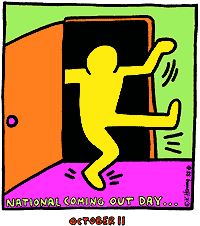 Religion is a touchy subject; just reading this post’s title makes us go “eek!” inside.
Religion is a touchy subject; just reading this post’s title makes us go “eek!” inside.
In many organizations, executives promote a message that people of all faiths are welcome, and that no one religion is espoused. Then they close on Christmas, which suggests that the Christian persuasion indeed is most valued.
So in a work environment where having a religious identity is expected, what can we do if we’re atheist?
Evolutionary biologist Richard Dawkins, increasingly the go-to spokesperson for atheists, has an answer: come out as such. The author of The Selfish Gene (Oxford University Press, 1976 and 2006) was recently featured in the New York Times, and he spoke about his upbringing, his beliefs about the world, and of course, his work. Michael Powell relates several facets of Dr. Dawkins, including:
His impatience with religion is palpable, almost wriggling alive inside him. Belief in the supernatural strikes him as incurious, which is perhaps the worst insult he can imagine.
On working in Britain:
It is a measure of Britain’s more resolutely secular culture that Professor Dawkins can pursue his atheism and probing, provocative views of Islam and Christianity in several prime-time television documentaries.
On perceptions of him by his peers:
Critics grow impatient with Professor Dawkins’s atheism. They accuse him of avoiding the great theological debates that enrich religion and philosophy, and so simplifying the complex.
And finally, his thoughts on the future:
He talks of the possibility that we might co-evolve with computers, a silicon destiny.
We ponder that too!
In revealing his philosophical beliefs as they connect with his research and areas of expertise, Richard Dawkins models coming out at work as an atheist. Which would seem scary, and yet he looks very comfortable.
Watch the video below, in which he talks about “coming out” as an atheist.
If you identify as atheist, are you out at work?
Image via
 National Coming Out Day (NCOD) on October 11th is not only for lesbian, gay, bi and trans people. You, too, can participate by coming out in one or more ways.
National Coming Out Day (NCOD) on October 11th is not only for lesbian, gay, bi and trans people. You, too, can participate by coming out in one or more ways.




